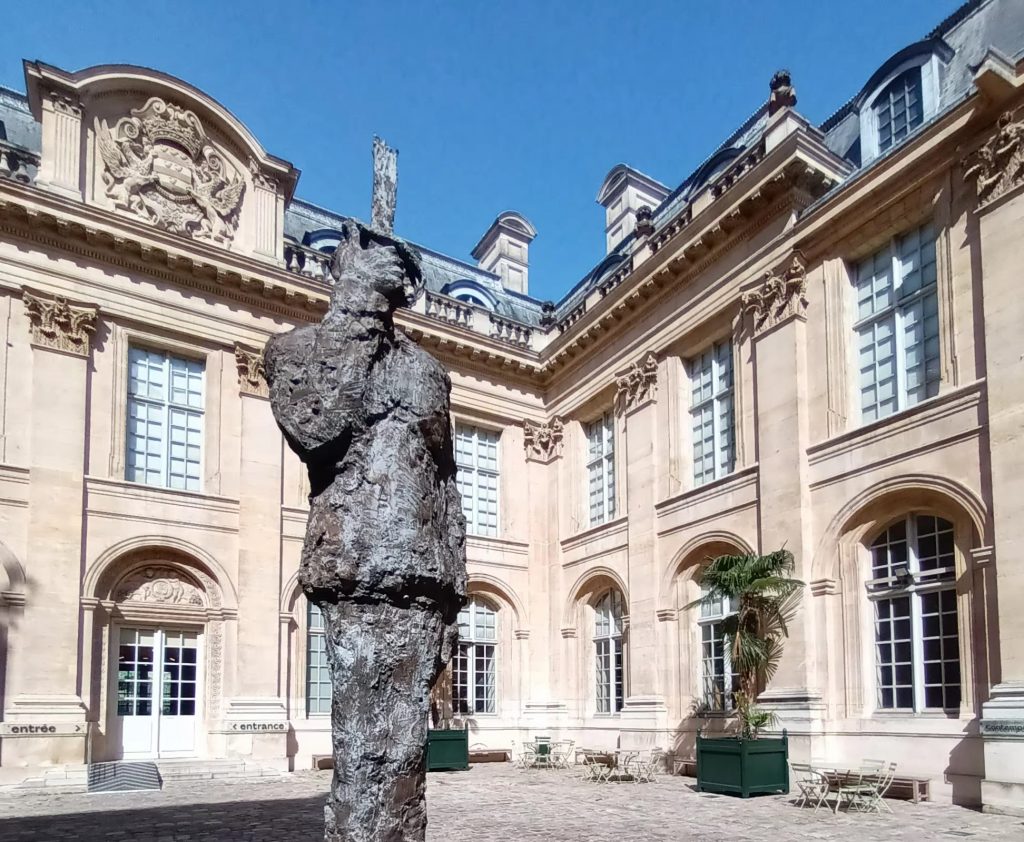The European Days of Jewish Culture kick off in Paris on 15 September, giving you the chance to discover the diversity of approaches to this year’s theme: “the family”. Thanks to the participation of numerous cultural institutions.

The Musée d’art et d’histoire du Judaïsme will be honouring women and their artistic and literary creations on the long and beautiful day of Sunday 15 September.
The permanent collection and the “Newcomers” exhibition, which pays tribute to three 20th-century women artists – Charlotte Henschel, Georgette Meyer and Sonia Steinsapir – are open to the public. The same applies to the exhibitions “Jérôme Zonder. It’s a little road” and “André Steiner. The body between desire and overcoming”.
Other activities on offer that day at the mahJ include:
– 10.30am-12.30pm and in the afternoon: a family workshop to discover the atmosphere of a tailor’s workshop of yesteryear through the history and diversity of the fabrics and cloths featured in the museum’s works.
– 11am-12.30pm: guided tour by Raphaëlle Laufer-Krygier, mahJ lecturer, on the fate of Jewish women struggling to overcome their status imposed by men and impose their own destiny.
– 12pm-6pm: the traditional book sale from the mahJ library’s extensive collection.
– 2-6.30pm: the book fair, where dozens of novelists, children’s authors, essayists, philosophers and leading Jewish women will be signing their works.
– 2pm-4pm: genealogical meetings with specialist speakers as part of workshops organised by the Cercle de généalogie juive (Jewish Genealogy Circle).
– 3pm: major interview with the great actress Yaël Abecassis, in conversation with the historian Ophir Levy.
– 5pm: Screening of the documentary “Raymonde El Bidaouia” (2020), in the presence of Yaël Abecassis. A documentary she made as a tribute to her mother.
From 19 September to 31 October, the Saphir gallery in the Marais will be presenting the first retrospective of the work of Spanish artist Elisabeth Ollé Curiel. This coincides with the publication of her monograph, ‘La beauté voyageuse’, written by art historian Delphine Durand. Because of her origins, she reinterprets the colours of the Caribbean in an invigorating multicultural expression. Her work draws on Venezuelan, Amerindian, Sephardic Jewish and Catalan references, breaking down boundaries.
On Saturday 21 September, from 5pm to 6.30pm, there will be readings in Yiddish and French on the theme of “Family stories: the Singers as seen by the Niborskis”. Texts read by Miriam Trinh, Ethel Niborski Trinh, Léopold Niborski de Milleret, Velvl, Eliezer and Yitskhok Niborski. The three generations of Yiddish-speaking Niborski bring this Jewish cultural memory into dialogue, as well as the complex family ties between the Singer siblings: Esther Kreitman (1891-1954), Israel Joshua Singer (1893-1944) and Isaac Bashevis Singer (1904-1991).
On Monday 14 October at 7.30pm, FARBAND, in partnership with ANIMA, is organising a musical conference with Mirélè Rozen and Didier Lapostre. The theme will be “When genealogy reveals unsuspected origins: the intertwined destinies of two Jewish families”. Both will reveal the destinies of these Jewish families, in an exchange intermingled with songs in Yiddish and French performed by Mirélè Rozen, as well as their works published by Anima & Cie: ‘Les petits secrets d’Antoinette-Alice Daltroff’ by Didier Lapostre and Chantal Panagopoulos and ‘Rose en ciel’, a CD-book by Mirélè Rozen.
On Tuesday 5 November at 6pm, Aki Estamos will be hosting a literary event at the Octavio Paz Library of the Institut Cervantès in Paris. It will take the form of a dialogue based on Aurélie Mossé’s book, “The phantom accent and other Sephardic impressions”, published in May 2023 by Presses universitaires de Vincennes. In this astonishing work, generations, absentees and the construction of those still present intermingle, integrating the memory and questioning of those absent, the spirit of Marranism and the fear of Jewish cultural erasure…
From 24 September to 3 November, the Théâtre de la Reine Blanche presents the play “In what way does this night…”, a reference to the Passover questioning of what changes from the ordinary. In this play, set on the evening of the holiday, a family exchanges different views on memories and the meaning of tradition. Two actresses and a musician whirl around the stage, playing a whole gallery of characters, imagined by the texts by Barbara Tissier and Renaud Tissier and directed by David Nathanson and Anne Collin.
Fédération des Sociétés Juives de France
On 20 October at 2pm, the Fédération is organising a free tour of the Parisian cemetery of Bagneux, its memorials and its Jewish collective burials. The tour will focus on the history of mutualist societies and their collective burial vaults, as well as some of the distinctive architectural features. Meet at the entrance to the cemetery, 45 Av. Marx Dormoy, 92220 Bagneux.
On 9 November, screening of two films on the theme of ‘Elles ont tenu bon. Two family stories. Two documentary films to tell the tale’. At 2pm: Alfred et Lucie Dreyfus, je t’embrasse comme je t’aime (2022) written and directed by Delphine Morel. The victim of an appalling plot, Captain Dreyfus was sentenced in December 1894 to deportation for high treason. Before her husband, Captain Alfred Dreyfus, is sent to prison, Lucie makes a pact to live at all costs until he is freed. 3.45pm: The Resistance fighter and the child (80 mins – 2024). Two testimonies intertwine: that of Eva Golgevit (1912-2016), a Resistance member in the MOI during the Occupation, who was deported to Auschwitz; and that of Jean, her son, whom she managed to hide. Eva recalls the terrible years, her struggle to survive in the camp through camaraderie and Yiddish song. Jean recounts his childhood, his stays with foster families, and the moving reunion with his mother at the end of the war. The love of music is the unbreakable bond that unites mother and son, passed on like a talisman of survival, through the choirs where Eva sang and the choirs that Jean, a violinist and composer, directed.